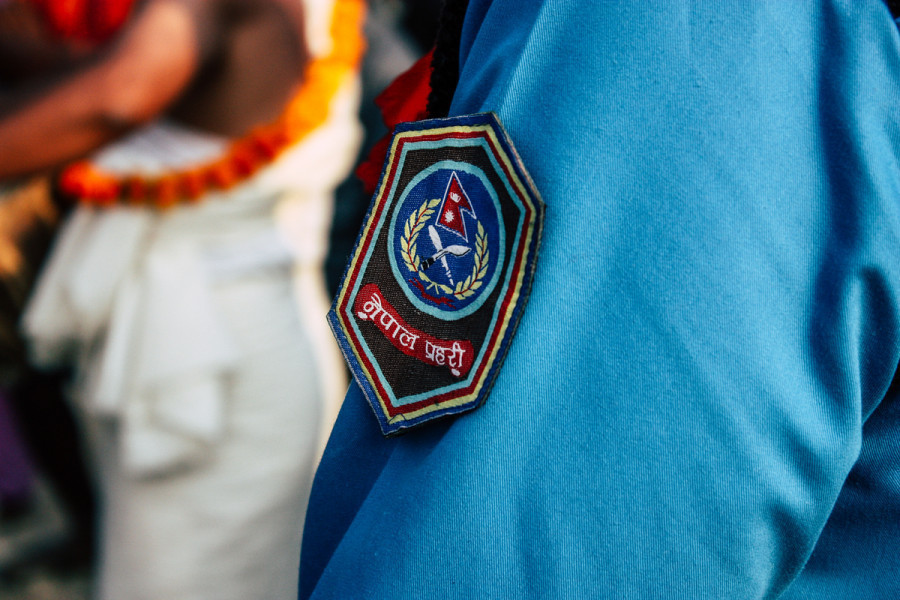Columns
A call for safety and trust
Between April 13 and March 7, the 100 hotline in Kathmandu alone received 349,774 calls—178,510 required active police intervention.
Apil R Bohara
From a very young age, every child in Nepal hears the word ‘police’ often in a way meant to scare them. Parents threaten, “If you don’t eat your food, the police will come,” or “Be good or the police will catch you!” This creates a fearful image that the police only come when someone does something wrong. Children also grow up hearing stories of ‘police and chor’ (cops and robbers), which makes them think that the job of the police is only to catch criminals.
However, as children grow, their understanding begins to change. They start to see the police in a new light—not as someone to fear but as someone to trust.
One powerful example was during the Covid-19 pandemic. At that time, even children who stayed home could see the police everywhere in pictures, on the news, in the streets—always in their blue uniforms, helping people. They delivered food, enforced safety rules, helped doctors and even managed funerals with respect.
It was a time of fear, but in that fear, the image of the police began to change. For many children and adults, seeing the police not with weapons, but with masks and care, made them realise: The police are not just for catching criminals, they are our real friends in times of crisis.
100: The emergency number
Among the many services the Nepal Police provide, the emergency helpline ‘100’ stands out because it is a lifeline, a direct line to help when someone is lost, be it in danger or in an emergency. It connects citizens to a team that responds with speed, care and responsibility—day or night.
Between April 13, 2024 and March 7, 2025 (2081-01-01 to 2081-11-23), the 100 hotline in Kathmandu alone received 349,774 calls, of which 178,510 required active police intervention.
Even more impressively, 63 percent of incidents were responded to within 5 minutes; 22 percent within 5–10 minutes; and 12 percent within 10–15 minutes.
However, the data also highlights the need for better resource distribution. Some police units, like Police Circle Boudha and Police Circle Maharajgunj, are heavily overburdened while others handle fewer cases. This imbalance can affect response time and effectiveness, reminding us that continual improvements are necessary.
Beyond emergencies
During major festivals like Dashain and Tihar, when most people celebrate with family, the Nepal Police remain on duty managing traffic, preventing crimes and responding to emergencies. A recent example illustrates their dedication. Just two weeks ago, a landslide occurred at Tuinkhola along the Muglin-Narayanghat road section during Dashain. While the nation was enjoying the holidays, police officers rushed to the scene, helping victims, managing traffic and keeping the public informed. Their quick response saved lives and showed their unwavering commitment even during festivals.
Rescue operations
Nepal is no stranger to natural disasters. Earthquakes, landslides and floods frequently impact lives and communities.
The Nepal Police are often the first responders during such crises, working hand-in-hand with other security agencies. One recent tragedy involved a deadly landslide that claimed 39 lives in Illam. In such moments, the 100 helpline becomes crucial in dispatching help, coordinating rescue efforts and saving lives.
Safety through the power of numbers
When we hear ‘numbers’, most immediately think of math, statistics or data. But have you ever thought about the numbers that save lives?
Emergency numbers are direct lifelines in times of crisis. In Nepal, the number 100 comes to mind instantly when there’s danger or an emergency. It’s the quickest way to reach the police. But Nepal isn’t the only country with such crucial numbers. Around the world, different nations have their own emergency contact numbers, often three digits, yet capable of triggering life-saving responses.
Imagine a case in Madhesh Pradesh, where a family is threatened by fraud and fears for their child’s safety. One call to 100 and the police arrive, control the situation and rescue the child. Though hypothetical, such incidents reflect real-life interventions made possible by the 100 emergency service. This number symbolises hope, protection and trust.
100 in the digital era
As we enter a rapidly advancing technological era, cybercrime is emerging as one of the biggest challenges for law enforcement worldwide, and Nepal is no exception. In the recent fiscal year alone, more than 1,960 cases were reported and 300 cybercrime cases were registered in Nepal, reflecting a sharp rise in crimes committed through the misuse of technology.
Cybercriminals are constantly finding new ways to exploit technology, from online scams, hacking and identity theft to AI-generated fake images and videos. The rise of artificial intelligence has made it easier to create deepfakes, manipulated content that can be used to blackmail, spread misinformation or harm reputations. This is not only a national issue, but a global concern. Combating it requires awareness, resources and rapid response.
However, many people in Nepal are still unaware of how to report cybercrime. When faced with online threats or harassment, most citizens instinctively dial 100, the emergency number they know and trust. While 100 is not the direct cybercrime helpline, Nepal Police officers handling the call often guide victims by providing contact details for the Cyber Bureau, including the appropriate phone numbers and email addresses.
This once again shows that 100 is more than an emergency number—it is a gateway to protection, assistance and the right information, even in complex digital cases.
Local and global force
The Nepal Police not only addresses national issues but also plays a vital role in assisting Nepali citizens living abroad. About 3.5 million Nepalis, approximately 14 percent of the country’s population, work overseas, mainly in Malaysia, the Gulf Cooperation Council (GCC) countries and India. Due to limited job opportunities in Nepal, many people migrate abroad to support their families. Most migrants work as semi-skilled or unskilled labourers in factories, construction sites and domestic jobs. Whenever Nepalis face problems abroad, such as fraud or threats, they contact the Nepal Police through their embassies or by email.
The Nepal Police has also started community-policing programmes to work closely with people, raising awareness and addressing issues like cybercrime and border security. Through these efforts, the police are building stronger ties with the community and ensuring safety for Nepalis both at home, and abroad.
The slogan “Police: My Friend” isn’t just a phrase; it’s a lived reality for thousands of people daily. So, the next time you feel unsafe or need urgent help, remember Dial 100. Today, as we celebrate the 70th Police Day, keep in mind: Your real friend is only a call away.
Bohara is a Superintendent of Nepal Police.




 8.54°C Kathmandu
8.54°C Kathmandu















